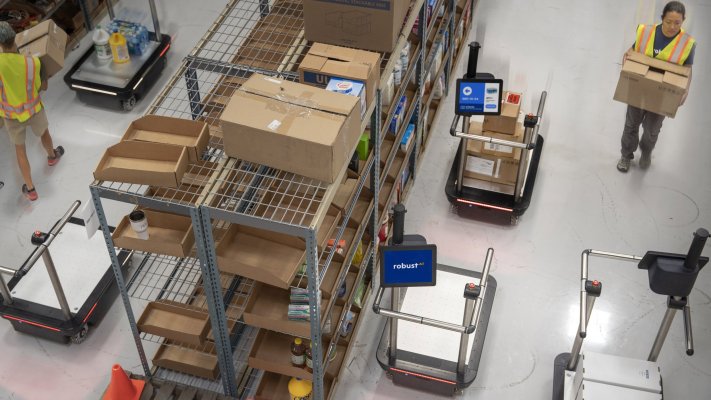When the company started, Robust.AI’s founders had no intention of making hardware. “Hardware’s hard,” co-founder and CTO Rodney Brooks tells TechCrunch, “and doing hardware at scale is harder. It takes a lot of resources and it takes a long time to get there. Which is why people love pure software plays: the marginal cost of another copy is free.”
The notion was, no doubt, compounded by Brooks’ long history in robotics hardware, first as an MIT professor and then as a co-founder of iRobot and Rethink. Doubly so in the wake of the latter’s 2018 closure.
“We started off trying to be a software-only company,” says co-founder, CEO and Brooks’ former student, Anthony Jules. “We started looking at the space and decided there was a great opportunity to really create something that was transformative for people. Once we got excited about it, we did very standard product work to understand what the pain points are and what it was that would really help people in this space. We had a pretty clear vision of what would be valuable. There was one day I literally said to Rod, ‘I think I have a good idea for a company, but you’re going to hate it, because it means we might have to build hardware.’”
Founded in May 2019, Robust.AI operates in the extremely popular — and wildly competitive — warehouse space. A number of companies formed in the wake of Amazon’s 2012 acquisition of Kiva already have large footprints in the category, including Locus Robotics and 6 River Systems. The category has since grown into arguably the most competitive in all of robotics. Piggybacking on the concept that drove Rethink, human-robot interactions are at the heart of Robust’s offering.
Carter — an autonomous warehouse cart — is paired with Grace, Robust’s software offering. The company will offer clients the two products bundled, with a RaaS payment model (though larger corporations can opt to pay upfront if desired). Brooks says Robust began building the former after discovering that there weren’t systems on the market with the on-board hardware the startup is trying to push.
“Silicon as gone pretty wild in the last number of years, with the end of Moore’s Law,” says Brooks. “We’re seeing these narrow floating point processors, like the Myriad processor from Intel that provides four teraflops per second, and we have eight of them on our robot for the same price as lidar. You can run so many models, you can do so much pre-processing of images, you can do so much better SLAM. You see the world, you understand how things change over time, you get a richer description of the world. And it’s cheap.”
This morning, Robust is announcing a $20 million Series A-1, led by Prime Movers Lab and featuring Future Ventures, Energy Impact Partners, JAZZ Ventures and Playground Global. The latter two led the startup’s $15 million Series A, back in late-2020.
Early videos of the Carter and Grace systems demonstrate more flexibility than other solutions. While they can navigate autonomously or follow workers around after a quick setup, human employees can also grab the handles and move them around manually, as needed. It’s a seemingly obvious feature, but that level of flexibility can be difficult to integrate into autonomous mobile robots.
“Very often people think about automation as a perfect or complete substitute for people,” explains Jules. “But it just doesn’t work that way. If you think about the overall system, and what needs to be done — and think about it as a balance between what machines do and what people do to maximize productivity and cost effectiveness — you end up with better solutions. That’s something people get wrong when you try to automate everything out, and that leads to systems that are both brittle and less cost effective.”
